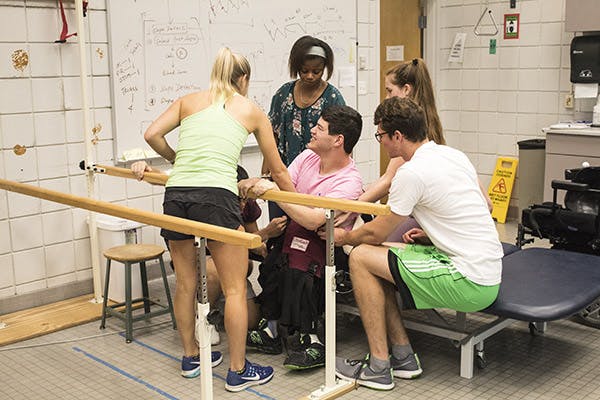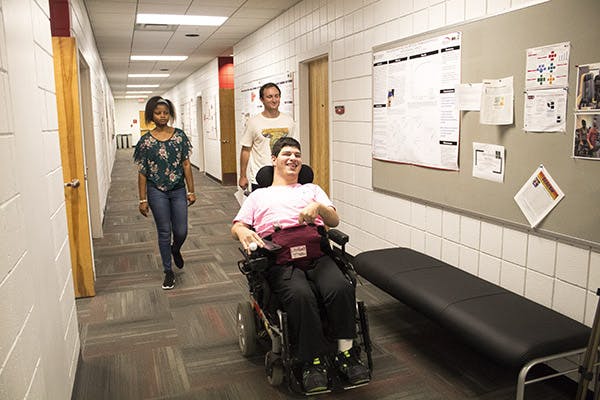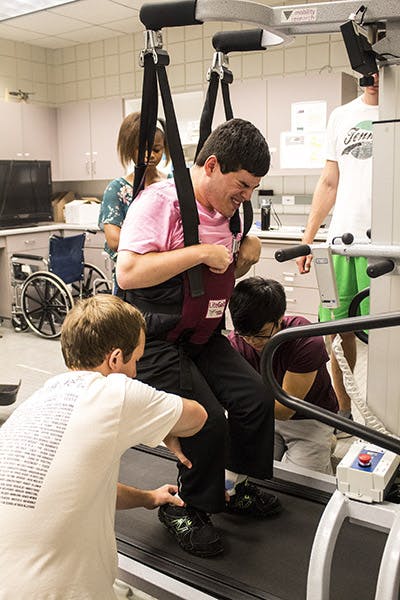Class benefits pre-health students, disabled community members
Matthew Dooley is not a fan of his wheelchair.
It's where he starts his days and ends them. It's how he gets to his job, where he plays video games and even works out.
 Except on Wednesday afternoons, when Dooley, 24, gets to straighten his legs, strap on a purple harness and go for a walk.
Except on Wednesday afternoons, when Dooley, 24, gets to straighten his legs, strap on a purple harness and go for a walk.
"It's incredible," says Dooley of the experience, which is part of a class taught by the University of Georgia College of Education. In it, community members with disabilities are paired with students who work with them to achieve physical goals. For some, this means gaining upper or lower body strength. For others, like Dooley, it's losing some weight.
The class is also an opportunity for pre-health students to gain hands-on experience working with clients, says Kevin McCully, professor in the department of kinesiology who started the class six years ago with eight students and five community members. This fall, the class has its highest numbers yet—43 UGA students and 33 community members.
The class has been so successful that McCully now wants to use it as a model that can be replicated at other colleges and universities around Georgia. It's a mutually beneficial opportunity, he says.
"There are hundreds of universities, and each one has dedicated pre-health students who want to learn, and every community has people with unmet physical needs—there is a demand everywhere," he says. "Every university in the country should be serving this population."
 At the start of each semester, small groups of students are paired with a client to discuss his or her goals. Then, working with McCully, the students devise a set of exercises to help them on that path. Throughout the semester they are supervised and McCully checks in to troubleshoot, but along the way students learn leadership skills and gain exercise and physical therapy experience.
At the start of each semester, small groups of students are paired with a client to discuss his or her goals. Then, working with McCully, the students devise a set of exercises to help them on that path. Throughout the semester they are supervised and McCully checks in to troubleshoot, but along the way students learn leadership skills and gain exercise and physical therapy experience.
While UGA students have access to a pool, modified exercise equipment and a special treadmill attachment that supports a person's weight—which allows clients like Dooley to walk—all a college or department really needs to start a similar class is some community outreach and a space to do exercises.
For students like Rosemary Peters, 19, a junior psychology major, the class underlines what she wants out of her career. It also satisfies one of the requirements toward her disability studies certificate.
"I want to be an occupational therapist, so this is pretty much what I want to do with the rest of my life," she says during a recent afternoon workout with Dooley. This is her first semester taking the class, but she and Dooley already have developed a rapport—she levies challenges (and occasional friendly bets) to push him a little harder in his workouts.
On that day, for example, Peters and other students encouraged Dooley with an incentive: If he met his workout goal, Peters agreed to shave off some of her long hair. With cerebral palsy, Dooley's workouts take on an extra degree of intensity; every movement requires extra concentration and spurs other involuntary movements throughout his body. But as he finished his 100th lat pull-down, Peters admitted defeat. She sectioned off part of her long hair to show Dooley what he won, and made plans to Facetime him from the salon.
This year, the class took on another dimension by incorporating members of the Destination Dawgs program. This inclusive program takes students with intellectual disabilities through a series of classes that develop leadership, independence and career-readiness.
Because many Destination Dawgs students want to work in fields related to occupational or physical therapy, says McCully, the class is a natural fit for their career experience.
 "They can take the class and assist someone leading a group," he adds. "So, they get some leadership experience—and it's also fun."
"They can take the class and assist someone leading a group," he adds. "So, they get some leadership experience—and it's also fun."
Justin Mejias is one of four Destination Dawgs in this semester's class. After just a few weeks of classes, he's now assisting clients as they move through exercises. "I thought it would be a new experience. I am studying music therapy and I'm going to get certified in sign language," says Mejias. "Here, I learn about different disabilities through the different clients that come in."
Peters came to know Mejias last semester when she served as his mentor, and they decided to take the class together and both learn skills they can use beyond graduation.
Another member of the student team working with Dooley is Megan Leith, a second-year human development and family science major. Her goal is to be a nurse, and the Disability Wellness class gives her invaluable real-world experience. While she says she had other options for experiential learning—for example, working in area care facilities or nursing homes—this class offers a range of ages, genders and disabilities.
"Future nurse practitioners, physicians' assistants and physical therapists gain a lot of patient care experience with this class," she says. "And social interaction is huge in regard to helping them develop more."
This semester she's learning more about patient care and gaining hands-on experience in a class that excites her about her future career. "I did this second semester last year and it was probably the best class I have ever taken."
